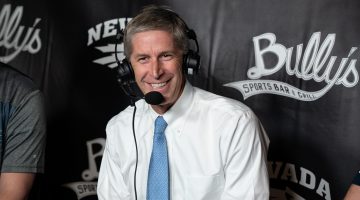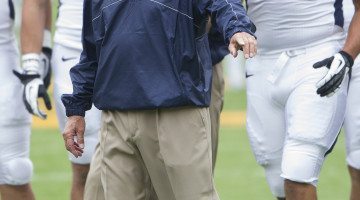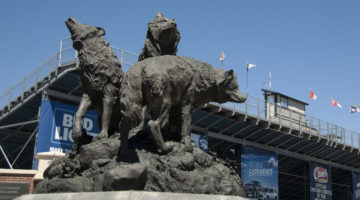
Photo courtesy of John Byrne/Nevada Athletics
Nevada Athletics Director Doug Knuth (left) poses with former Nevada running back Don Jackson (right) at his graduation ceremony. Knuth was hired at the AD in 2013.
by Jack Rieger
On Friday, April 1, I sat down with the University of Nevada athletic director Doug Knuth. I asked him how he convinces talented coaches like Eric Musselman to stay at a smaller school, whether or not the NCAA should be paying student athletes, the model for building a dominant athletic program and much more. The interview has been edited for length and clarity.
Jack Rieger: You graduated from the University of Connecticut with a degree in management and marketing, which I think is interesting because UConn is this academically prestigious school tucked away in the Northeast corner of the country, yet they have this unbelievably successful college basketball program that pumps out championships every year. Do you think that model is replicable? Can you translate that model of an academic-centric school in the middle of nowhere and make them excel in athletics, or is UConn the exception to that?
Doug Knuth: No, not at all. It’s been done in all parts of the country. Have you ever been to Iowa City, Iowa? That’s where the University of Iowa is. Have you ever been to West Lafayette, Indiana? That’s where Purdue University is. There are major academic institutions in these little tiny towns all across the country and they have big time athletic programs, so UConn is not unique. That model is everywhere.
JR: UConn’s success in college basketball didn’t really start until 1990, but I’m not sure what ignited that success. Probably hiring [Jim] Calhoun. So is that how you make a program great, you have a great hire? Is that the model?
DK: That’s exactly right. You hire a great coach. UConn did it with two great coaches: Geno Auriemma from the women’s side and Jim Calhoun on the men’s side, and they stayed. They built the program and brought it to a national stage and they stayed. That’s the model. If you look at what Boise State has done in football, Boise State has grown out of nothing and a lot of that is because Chris Petersen stayed. Mark Few from Gonzaga stayed. Wichita State basketball, their coaches stayed. So that’s the key; you hire a great coach in any sport and you’ve got to figure out a way to make sure that coach sticks around, and if you do, you have a chance to build something special.
JR: Well that’s got to be the challenge then. How do you convince really talented, ambitious coaches to stay at a smaller program like Nevada?
DK: It’s interesting because we have the conversation on the university level too. The [university] president would tell you he has that same conversation with really talented research people, really talented professors because they get recruited away too. So we all do the same thing; we all try to figure out how to keep your most talented people and keep them happy and keep them on staff as long as possible.
From a leadership and management perspective, the key is you have to figure out people and understand what motivates them and interests them. Is it money, or winning or is it quality of life? There’s all kinds of reasons people enjoy their jobs and work where they do, and that’s part of my job is to figure out what makes people tick and try to make sure I’m satisfying them in areas that are most important to their life.
JR: So do you worry that Eric Musselman, who’s going to make the basketball team better every year he’s here, will leave when a program like Washington or Stanford comes knocking?
DK: I worry about all of our coaches, and we have a lot of great coaches. I want them all to stay here; I want them all to be happy and win like crazy here. Coach Muss is no different, but absolutely I worry about it. He’s a great guy; he’s perfect for our community and this university. He and I both want to build this into a national basketball program. He has all the resources he wants and needs to win here. I’m not dodging the question. The answer is yes, I do worry about it. I have to make sure I’m doing my job, which is giving him the resources he needs to be happy here and to win here.

Photo courtesy of Nevada Athletics. Athletic Director Doug Knuth (right) embraces basketball coach Eric Musselman (left).
JR: You said part of your job is to diagnose what makes coaches tick. What makes Muss tick? What is it that he really cares about? What is going to keep him at Nevada?
DK: Like most great coaches and people in the top 1 percent of their industry, they’re motivated by success; they want to win. Money I don’t think is a big motivator for Coach Muss. I think he’s motivated by winning. He wants to be at a place where he can win like crazy and have a good quality of life and a comfortable quality of life. I think this is a perfect spot for him, and I hope he stays for a long, long time. Can he do that at Nevada? The answer is yes.
JR: I’m really interested in the hiring process, although I know it’s only one aspect of your job and you have a lot of other things to worry about. Here are some of your hires in your three years as athletic director: you start with Jay Johnson in baseball, who wins Nevada’s first Mountain West title in any sport. You hire him as an assistant at the University of San Diego, and he’s never been a head coach at the D-1 level, just at the NAIA level. Lee Nelson in women’s volleyball; team has its best season since 2010 and he’s totally changed the culture. Neil Harper: a great person with an awesome accent. Team wins two NCAA titles, a Mountain West Championship and has four All-American honors. And then Musselman, whose team wins 24 games this year and the future looks exceptionally bright. When you’re making a decision on who to hire for a particular job, what is that process like and how do you arrive at the position, because not all of these coaches are proven?
DK: Well everyone’s unproven until they coach at this level. Muss has 566 career wins as a head coach in pro basketball, but completely unproven at the collegiate level. Can he recruit and manage a staff and do all the stuff that collegiate coaches do? It’s a completely different deal than pro ball. It could be I’m hiring a marketing director, could be I’m hiring an academic support person, a compliance person. It’s a role of the dice every time. The key is to reduce the risk in hiring. You never get 100 percent right, but the key is understanding who you are and what you stand for as an organization and then hiring people who fit that organization. We hire people that understand academics are most important. We’re not the San Francisco 49ers or the Sacramento Kings. We’re about education and hiring people who understand that because then they’ll recruit the right kinds of kids.
There are three things I look for in coaches: we have to find people that are unbelievable recruiters because we don’t get four and five star recruits very often. Those kids go to Duke, or UCLA or USC. We get kids that are late bloomers; they’re raw with untapped talent and overlooked in high school.
The second thing is we have to have coaches that are unbelievable with player development because they’re going to get kids that are raw, undersized and underdeveloped. We have to have coaches that take that raw talent and develop it so our players are better as sophomores than they are as freshman. And hopefully by the time they’re a senior they’re being talked about as an all-conference player.
The third thing is finding coaches that are really great at community engagement, really great at working with alumni and speaking at rotary clubs and fundraising. We have to do that here because we don’t have a really huge budget. Those three things I’ve been really consistent with in hiring and it’s worked out really well so far.
JR: I saw that you were a four-year letter winner on the tennis team at UConn and the team captain. Do you still play tennis?
DK: I do play, but I wish I could play a lot more. I work out all the time and take care of myself so I’m still pretty athletic and can get after it, I just don’t have a lot of time. To be good at anything you have to play like three of four times a week. I’m not very good at being bad; I hate being bad, so if I’m going to do anything I’m all in. So I’ll play tennis after basketball ends up until football starts and I’ll play three of four days a week and get pretty good and then retire again for the next six months. I can’t play once a week; I’m not a recreational player.
JR: UConn women’s basketball is going for its fourth straight National Championship; the team has won 73 games in a row, and they are the only dynasty in sports right now. Is their dominance good for women’s college hoops or is it unhealthy?
DK: No, I love it. And I loved when Tiger Woods was at the top of his game. I wanted him to win every weekend. I turned on the TV to watch Tiger, and I couldn’t tell you the last time I watched a golf tournament. That’s the only time I’ve ever watched the PGA. I love watching people that are excellent at what they do and it doesn’t matter what it is; it could be golf or ping-pong or basketball. I love watching people at the top of their industry.
JR: Right, so you respect their success because that’s a result of work and great hiring and their athletic department. But if they’re up 50 at half, from a fan’s perspective, don’t you think a lot of people check out and stop watching?
DK: Yeah but even up 50 at half, their superstar Breanna Stewart is still playing hard and so is their other star Morgan Tuck. They could just put it in cruise control up 50 at half but they continue to play hard and push the ball on offense. They want to be perfect and I love that.
JR: Whether or not to pay student athletes is a tired debate in sports. I want to give you my opinion on it, if that’s OK. I think very few college football programs drive the bulk of NCAA revenue. So the idea to pay every student athlete the same thing would sort of be ridiculous, and for that reason I’m against it. It has nothing to do with the mystical nature of the amateur status. What is your opinion?
DK: There is a big component of the conversation that unfortunately doesn’t come across in the national media because it’s not fun to talk about. Title IX is a federal law that says you have to provide equal or similar opportunities for males and females. So to say that because men’s college football and basketball drives all the revenue so they should get paid and no one else deserves it is against the law. You have to spend the same amount of money on the women’s side. That’s volleyball, women’s basketball, softball, soccer and more. The money adds up quick, and you can’t just say we’re only doing the revenue sports. It’s against the law.
As a former college athlete I feel like I was given such an opportunity to play the sport I loved. I got to travel around the country. I got uniforms, equipment and clothes provided to me. I got fed. I got access to great coaches, strength rooms and doctors. I felt like I had such a good opportunity that it would’ve felt weird to say I’m not doing this unless I get paid. I felt very fortunate.
If you told me I had to dig ditches for five hours a day, then I’d say you should probably pay me because I’m not enjoying this, but I got to play the sport I love and the thing I’m really good at. And I think our athletes feel the same; they feel like they get a great opportunity and a great education that’s paid for. You graduate in four years debt free; that will provide opportunities for you for the rest of your life. You can see where I’m going with this. I’m not for paying student athletes.
JR: You were in charge of external relations at the University of Utah for eight years prior to coming to Nevada. Correct me if I’m wrong, but that sounds like you were in charge of convincing outside donors to donate to the athletic program. How important is that process to the success and growth of the athletic department?
DK: It’s as important as anything else we do. You’ve got to have money to do all the things we do, so you’ve got to be able to raise money. We can’t rely on the state, or university or student fees for more money. That’s my job now as much as it was at Utah or Michigan State.
JR: I read you doubled Utah’s annual funds in five years. What is it that makes you so good at networking and convincing people that donating to your local college’s athletic department is a worthwhile investment?
DK: It’s interesting because a lot of what we do in fundraising is driven by ticket sales. We raised about $5 million here and 60 percent of that is driven by required seat donations in football and men’s basketball. At Utah, my timing was probably pretty good but we had a lot of success in football. We put systems in place and put people in place in order to maximize revenue off of football’s success. We were selling a lot of tickets in football and it was driving revenue thanks to the systems we had in place.
A perfect example is here, in 2010, Colin Kaepernick’s senior year. Nationally ranked. Beat Boise on ESPN, then playing in the Kraft Fight Hunger Bowl. All those things happen and the next season Nevada sold just 200-400 new season tickets after the greatest year in the history of the program. That’s because we didn’t have the right systems and people in place. We probably sold over a thousand season tickets last year and we went 4-8 the year before and 7-6 last year. That’s customer service and supporting our fans and creating a good atmosphere.
JR: What do you plan to do with Lombardi once the new gym is built? I’ve heard it will act as a building for athletics.
DK: Yeah, it will be. It will actually be a shared facility. Once the new Weigand Fitness Center opens up, which will be open in January of 2017, the intramural department will move there and we’re going to move in and renovate Lombardi. We’re going to add six new basketball hoops, new lighting, new scoreboards, new sound system. And then the weight room will have new lighting, new floors, new weights and Wolf Pack stuff. The upstairs will go to community health sciences and dance studios. It’s a $2.5 million renovation.
JR: You seem to be really accessible to students and fans. Why is that? Because you don’t have to be. You could be a recluse in your office all day.
DK: I always tell people I can’t be successful by sitting down at my desk. You have to be out in the community and engaging with people that support you. We ask a lot of our fans. We ask them to buy season tickets, and to donate and support our teams and to come to all of our games and activities. I feel like that’s part of the deal, to be out there and thanking them and talking and engage with them. That’s fun for me. The student thing is a blast. The first week of school when they do the wolf it down pancake feed, I’ve been there every year I’ve been here. Midnight pancakes, what’s better than that?
JR: Pretend you’re the person who evaluates your performance as the athletic director, whomever that may be. What grade would you give yourself through your first 2 1/2 years, and what would be some of your criticisms?
DK: Wow that’s a good question. I evaluate myself all the time and it’s usually not very good. I wouldn’t call myself a perfectionist but I try my best at everything I do. We’ve had success in some areas, but there are areas we’ve missed. When you look at the sum and try and total it up, probably a B. We’re so far behind our direct competitors that I feel like we’re always chasing to catch up. That’s not necessarily a bad thing because I feel like I’ll never get there. If we’re number one in the conference in every sport, I feel like we’d still be chasing someone. That’s being a competitor; I grew up like that. There’s always someone better, there’s always someone you’re chasing.
Jack Rieger can be reached at jrieger@sagebrush.unr.edu and on Twitter @JackRieger.












